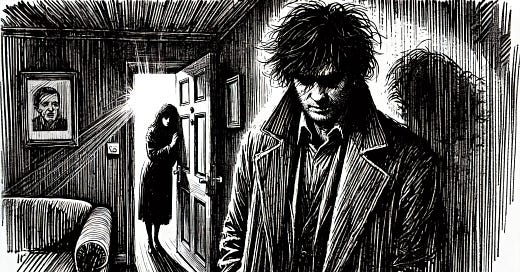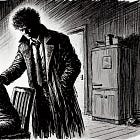Inside, it’s dark. I move closer to him, touching his coat and hiding behind him. He takes a step inside, his figure blocking the light coming from the landing. With his right hand, he searches for a light switch. I can hear my breathing getting heavier. The lights come on. There’s a large entryway. The walls are bare, but the finishes are modern, recently done. A white lacquered shelf is against the wall in front of us, with an unused key tray on top. It’s made of aluminum, shaped like a fluid conch shell. The officer steps inside and looks around. The light comes from several LED spotlights embedded in the ceiling—four of them. I follow him. To the right, there’s another shelf, and above it, attached to the wall, is a white video intercom. On the left wall are four coat hooks fixed to the plaster.
I gently close the door, guiding it until I hear the lock click shut. Then I turn to follow him. He’s already in the next room, lit by more LED lights. I follow. I step into a large open space, more than ten meters long and about six meters wide. Two rectangular pillars stand in the center of the room. On the left are three windows covered by shutters. At the back is an aluminum desk, clear of any clutter. Behind it, there’s a large black-and-white photograph of two gears.
The man walks straight ahead, toward the desk. To the right, there’s a closed door. I turn and notice a living area with a sofa and a chaise longue facing a flat-screen TV with a light gray frame. A glass coffee table sits between the couch and the TV. The room’s lights aren’t all on—some areas are in shadow. The TV is mounted above a cabinet housing several devices, which seem to be amplifiers. Two vertical speakers stand on either side of the TV, each about a meter and a half tall. They’re black, with fabric covering the front. The side panels seem to be wood—ebony, judging by how dark they are. Or maybe they’re just painted. Speakers. There are more black-and-white photos on the walls, all sharp and clear. One shows an empty cinema in the dark, its screen bright white. More than a cinema, it looks like a theater, judging by the decorations around the screen. It looks like a theater dressed up as a cinema.
The man in front of me reaches the desk and stops. He examines the surface, running his fingers over the smooth top. He stands there, still, silent.
I head toward the living area. Behind the pillars are shelves full of CDs and DVDs. Classical music, ’70s rock. The prog rock I could never listen to for more than five minutes straight. And then post-rock—Mogwai, EF, Explosions in the Sky, GYBE. Those I liked. I liked them a lot.
- There was a computer here.
I lean out from behind the pillar.
- What?
- There was a computer on this desk. - He taps his finger on the surface - and now it’s gone.
- How do you know?
- There’s an imprint left by the monitor stand here, and on the floor, there are power outlets and an Ethernet socket.
I pull out my phone and turn on the Wi-Fi. I search for networks. It finds a couple, but the signals are weak. They don’t belong to this house.
- There’s no Wi-Fi here. That’s strange. Marzio would never have been in a house without Wi-Fi.
- There was a computer here, and now it’s gone.
I lean against the back of the couch, looking at the music Marzio listened to. I exhale slowly. I scan all the titles, one by one. I recognize them. We listened to them in the car, each with its own particular flavor. I smile. On the bottom shelf, I see Tori Amos. All her albums. I kneel and reach out. I grab Under the Pink, then From the Choirgirl Hotel, and Little Earthquakes. You gave me this one after our first month together. I still remember. We sang it together. You, with that ridiculous falsetto that always made me laugh.
I laugh silently. I miss you.
I put Under the Pink back. But something feels off. I can’t quite figure out what. It’s as if the side of the pillar is scratched or maybe dented. I pull out a few more CDs, then a few more. I empty half the shelf and crouch down for a better look.
There’s a numeric keypad. It’s gray. At the bottom, I see a straight slot, slightly less wide than the shelf, rising at the sides and hiding behind the upper shelf. I remove all the CDs from the upper shelf as well and see the last side of the rectangle carved into the pillar.
- What are you doing? - The officer peers around the pillar.
- I found something.
He crouches down next to me.
- Is this a damn safe? - he clasps his hands over his knees.
Above the numeric keypad is a five-digit LCD display. He points at it.
- Do you know any codes? Any important dates? We need to open it.
He brings his finger close to the metal of the door. It’s painted white like the pillar, with only the keypad standing out in its metallic color.
I exhale very slowly. My hand is in the pocket of my jeans. I feel the paper under my fingertips. I pull it out and unfold it under the officer’s wide eyes. He looks at me but says nothing.
I extend my finger, watching it tremble as it approaches the keypad. I type the first number, and a red asterisk lights up on the display. Then a second, and another, until it fills up. I keep typing. All the digits.
Here’s the last one.
I press the button.
The asterisks disappear.
The word OPEN appears, and the automatic lock opens with a faint buzz.
The door tilts toward me. I reach out and open it. A dim light illuminates the contents.
An aluminum-bodied MacBook.
- Perfect. - I hear his enthusiasm behind me.
I pull the laptop out of the safe. We both stand up. He points at it.
- Shall we turn it on?
I nod.
- Let’s sit down. - He gestures toward the desk.
I walk quickly, my strides long, with him half a step behind. I pull out the chair and sit down. The laptop in front of me. I sit there, motionless, drained. I stare at the apple logo on the casing.
He’s standing in front of me, waiting for me, I guess. He puts his hands on his hips. I can’t see his face. He decides, reaches out, and opens the screen. He walks around the desk, tilting his head to look at the screen.
- You knew him well, didn’t you? Well enough to know his passwords. He presses the power button.
I shrug. He resumes walking and heads toward the door on the right.
- Take your time.
The chair is comfortable. Soft. The seat is low, just the way he liked it. The computer has started up, waiting for the password to unlock it.
I try the one. His password. Our password. I tell myself I’m just trying, but I know it will work. I press enter after typing the last letter. The login window disappears, and a second later, the desktop appears.
- Done. - I say aloud.
I open the mail app and the Finder. I search through the documents while waiting for the emails to load. The folders are well-organized—files arranged in a tree structure: correspondences, accounting, various documents, divided by year and then by category. It’s easy to navigate. I know this world. It’s vast, deep, and sprawling. I can almost see his hands, his eyes in this screen. I click through the folders, imagining his hands on the keyboard. His profile illuminated by the screen, the faint nighttime glow lighting up the room. It’s as if I’m standing three steps away, watching him as I explore his computer, and he is me.
His arms, his face—they are me. And this sense of merging is a fleeting moment. It overtakes me, and I realize I’m overtaken. I return to my own body, suddenly. I stare at the screen, unsure of what I’m looking for.
- Have you found anything?
His voice echoes faintly from the other room, reverberating softly off the walls. I breathe.
- I don’t know what to look for. - The words drain the strength from my shoulders.
It’s the truth, the simple truth. And it leaves me powerless. A fragile framework where I rest my skin, and the darkness is lit only by the tiny flicker of a candle so small it can’t even illuminate itself.
- You don’t know what to look for, huh?
He steps out of Marzio’s room, holding some letters, unopened envelopes. He flips through them, reading the senders on the back. He opens one, the paper making a crisp sound as it slices through the air. He walks over to me and glances at the contents, distracted. Then he places it on the table in front of me.
- That’s normal. Happens to me every time. What comforts me when I don’t know what to do is that, most of the time, the things we’re looking for aren’t hidden. - He says, his gaze wandering around the room. - You just have to see them. - He looks at me. - And to see them, it sounds silly, but you shouldn’t search for them. In fact, the less you search, the more they’ll appear right before your eyes... Is that the mail program?
The inbox window has appeared on the monitor. There are many unread emails. Ads, recently arrived, and other emails I’ve already seen on the Gmail account. All already checked.
- There’s nothing here. - I say. I don’t want to scroll down too far, don’t want the emails from Lili or Cardia to appear.
He stands beside me, reading the subject lines with me. I feel uneasy. I don’t want him to know about those conversations. I look for a distraction, something to say or do, when I see it. Another email account. With a dedicated folder. The folder is called “Me.” Without thinking, I hover the cursor over it and click.
- What did you do? - he asks behind me. - I was reading.
- Sorry. - I say, my heart pounding.
I’m afraid of discovering something with him and then having to explain what I know. But it’s too late now. The folder is already open.
Both of our eyes are fixed on the first email in the list. Dated a week ago. Sent by the law firm Grassia. Lawyers. The subject line is Challenge.
In the preview window, there are just two lines.
Dear Marzio, I’ve reviewed the documents, and we’re ready to respond to the challenge of Dr. Cardia’s will. As you mentioned, the key issue is the transfer of the Golden Share to you. We have plenty of room to address this. Come by the office tomorrow so we can discuss the matter further and decide on the best course of action.
- What’s the Golden Share? - I ask, my voice almost childlike. I immediately feel a bit ashamed.
- It’s a right. A right that Marzio’s father gave to Cardia. And that Cardia seems to have given to Marzio when he died.
- What kind of right?
- A right that concerns Prosud. A right that would have given Marzio significant power.
- I don’t understand.
- There’s not much to understand. Are there any attachments?
I check the header—no attachment icon, but the quoted text in Marzio’s email refers to an attachment. I click on the sent folder and search for the email. I find it, open it, and there it is: Challenge.pdf. I open it.
We stand still, reading.
The challenger is Umberto Solimena.
I lose my breath.
Copyright © The MaDMan, 2013. All rights reserved.
No part of this publication may be reproduced, distributed, or transmitted in any form without permission.









Wait. This is NOT chapter one of whatever story this is lol
Ah, Umberto is after that golden share and now he's been found out, at last. Of course, they're not even out of that house yet. I don't think Umberto will just let this go. It's heating up now. I'm looking forward to the collision around the corner.